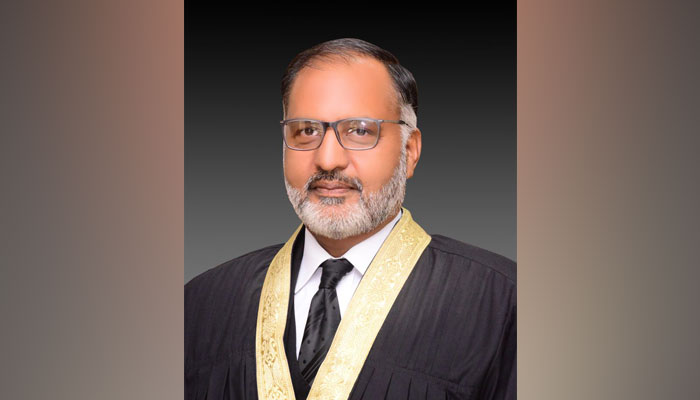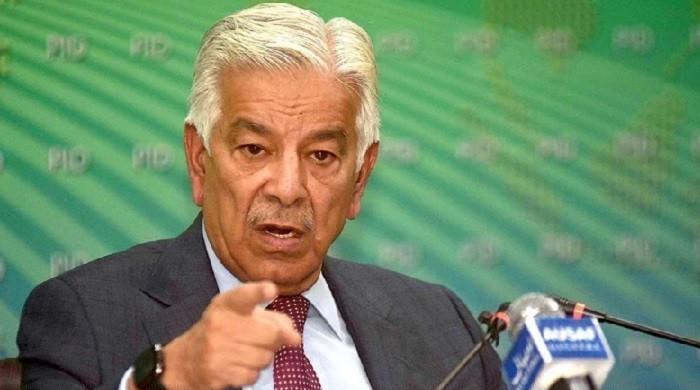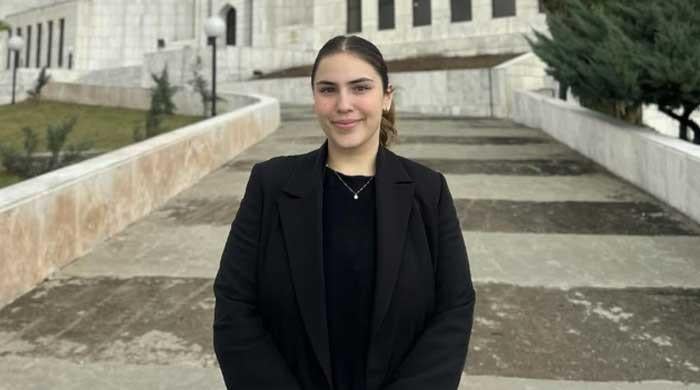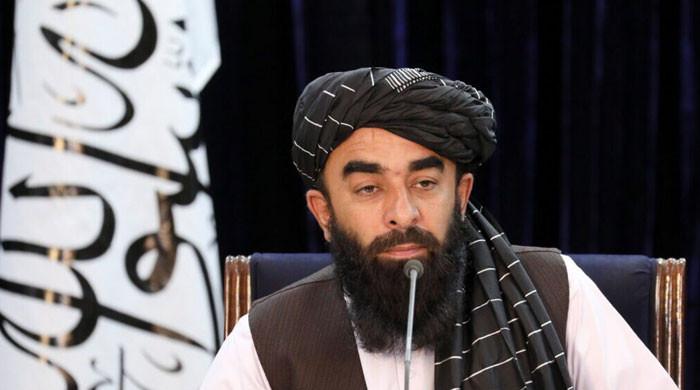SC declares Justice Shaukat Aziz Siddiqui's removal illegal
Justice Siddiqui was not given an opportunity by the SJC to establish his allegations, says Supreme Court
March 22, 2024

- SC sets aside notification ordering removal of Justice Siddiqui.
- Says Justice Siddiqui should be considered retired with all benefits.
- Says SJC failed to prove allegations levelled by Justice Siddiqui.
ISLAMABAD: The Supreme Court on Friday declared the removal of former Islamabad High Court (IHC) Justice Shaukat Aziz Siddiqui illegal, directing that he may now be considered as a retired judge.
The decision was announced by a five-member bench of the apex court headed by Chief Justice of Pakistan (CJP) Qazi Fazi Isa in a 23-page judgment. Apart from the CJP, the bench comprised Justice Amin-ud-Din Khan, Justice Jamal Khan Mandokhail, Justice Syed Hasan Azhar Rizvi and Justice Irfan Saadat Khan.
The verdict noted that the Supreme Judicial Council (SJC) proceeded against Justice Siddiqui on the "assumption that the truth or falseness of the allegations levelled" by the former judge was "irrelevant". It also noted that the SJC opined that Justice Siddiqui had failed to substantiate, independently corroborate, substantiate or prove the allegations levelled by him.
The judgment did note that the allegations made by the former IHC judge against Maj Gen Faiz Hameed and a few of his subordinates were "very serious".
"However, Justice Siddiqui was not given an opportunity to establish his allegations nor brought face to face with those he had accused. When we noted this lapse we issued notices to all those against whom he made allegations and provided them with an opportunity to admit/deny them. All of them have denied their stated involvement," the order said.
The court order further highlighted that in view of the rejoinders submitted to the judicial panel, it was all the more necessary for the SJC to have inquired into the matter and to have determined who was telling the truth.
"The SJC did not give any credence to Justice Siddiqui’s own words and to the contents of his replies; the SJC assumed that they were false; and having made this assumption concluded that Justice Siddiqui was guilty of misconduct. It would be difficult to categorise such a determination as fair or one which accorded with the requirements of due process. Justice Siddiqui was not given an opportunity to establish the veracity of his allegations, which was incumbent on the SJC when the same formed the basis of Justice Siddiqui’s removal from office," stated the judgment.
The bench also noted that Article 10A guarantees a right to a fair trial and due process including judges which the Supreme Court stated that Justice Siddiqui was "deprived of". It noted that the judge was not "provided with an opportunity to establish the truth of the allegations" and instead was "punished for levelling them".
The Supreme Court noted that if the SJC, after conducting an inquiry, had found Justice Siddiqui's allegations "false" then he "would have been guilty of misconduct", but it could not state that the allegations were false without holding an inquiring into the matter.
The verdict also said that the SJC "did not state what particular misconduct Justice Siddiqui was guilty of" and was rather "shocked" because the IHC judge "had made serious allegations and had done so publicly".
The verdict also stated that two complaints — one from the chief of army staff and the other from the government — received by the council, sought probe into matter. It also added that Justice Khosa in his opinion had also asked the SJC to hold an inquiry into the allegations.
The Supreme Court also stated that then attorney general for Pakistan, Anwar Mansoor Khan, undermined his credibility with his conduct. It further stated that the lawyer "misled" the SJC by contending that the body "could go beyond the provisions of the Code of Conduct to determine what constitutes misconduct by a judge".
"In disregarding due process requirements individual freedom was curtailed and truth stifled," stated the verdict.
The verdict also noted due to the delay in the hearing of the petition Justice Siddiqui had reached the retirement age of a high court judge therefore he cannot be restored on his position.
"In view of the aforesaid reasons the SJC’s Report/Opinion, dated 11 October 2018, which was submitted to the President and the Notification No. F.9(2)/2018-A.II, dated 11 October 2018, stated to have been issued on the advice of the Prime Minister and his Cabinet of Ministers are set aside. Consequently, Justice Siddiqui shall be deemed to have retired as a Judge of the Islamabad High Court and he will be entitled to receive all the benefits and privileges due to a retired Judge, by allowing these petitions in the above terms," concluded the verdict.
Justice Siddiqui's removal
The SJC had moved against the judge over a controversial speech before the District Bar Association, Rawalpindi on July 21, 2018.
Justice Siddiqui in his speech blamed the higher judiciary for the country's "deplorable" state of affairs.
The judge had also alleged that then Major General Faiz Hameed and his subordinates wanted cases related to Faizabad sit-in, Nawaz Sharif and his daughter Maryam be decided in a "particular manner".
The army had also reacted to the speech and had requested the Supreme Court to initiate "appropriate process to ascertain the veracity of the allegations and take actions accordingly".
In October 2018, then-president Dr Arif Alvi removed Shaukat Aziz Siddiqui from the post of IHC judge in light of a recommendation by the SJC.
The recommendation stated: “Mr. Justice Shaukat Aziz Siddiqui, Judge, Islamabad High Court, Islamabad had displayed conduct unbecoming of a Judge of a High Court and was, thus, guilty of misconduct and he is, therefore, liable to be removed from his officer under Article 209(6) of the Constitution of the Islamic Republic of Pakistan, 1973.”
Justice Siddiqui then challenged the SJC decision in the Supreme Court in the October of the same year. However, the registrar of the Supreme Court objected to the petition.
But on March 25, 2019, those objections were lifted and the registrar was directed to allot a number to Justice Siddiqui's plea.
Following this, the petition was first heard by a five-member bench headed by Justice Umar Ata Bandial in 2020. The bench held 13 hearings of the plea and the last hearing was held in June 2022. Since then the plea was not taken up.
Since three members of the Justice Bandial-led bench had retired a new bench was formed and the matter was taken up on December 14 of last year.











